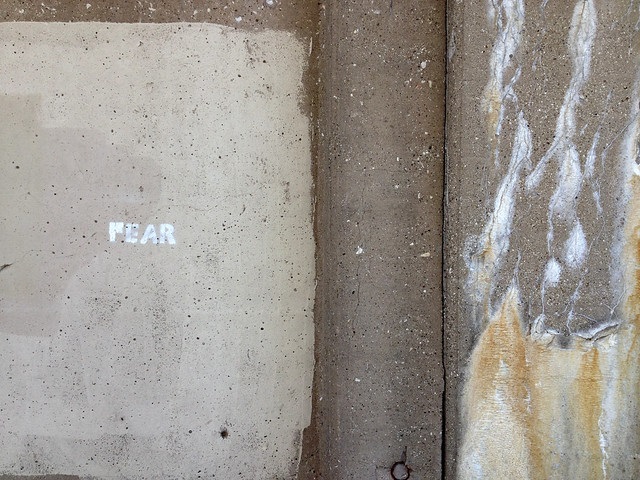Fear. I get it. That seems like the most reasonable response when it comes to witnessing about 6,000 demons being exorcised in front of your eyes. That kind of power? That kind of fearlessness? That kind of miracle?
Regardless of Jesus’ identity, and remember, we have a couple of thousand years to get used to and accept Jesus’ astonishing acts, such a moment should indeed be the cause for some serious alarm and apprehension. It’s the kind of fear that combines both fright and hope, both anxiety and wonder. It’s that kind of fear that exposes the uneasy intersection of “how can this be” and “please, please, let it be.”
Beyond the many layers of impossibility of this salvation story — deemed uncleanness, demon possession, ostracism, imprisonment, living among the dead — is the chance that restoration is possible. And maybe therein lies the fear. Fear that it could be true — and fear that in what you have hoped, in what you have dreamed, could be devastated once again.
After all, we get used to excluding those possessed, those who seem not able to live within an acceptable sense of control, those who can’t quite exist within the boundaries society has so carefully established to keep order. What do we do those people? What do we do with ourselves if we happen to be one of those people?
And so, given these initial personal responses to this story this time around, I realize once again that I have a hard, hard time with this text, as much as it has sort of a happy ending. More than ever before, I have a feeling that this is one of those passages in Scripture that if you read it out loud in worship without preaching on it, it will land in spaces and places where the shame and blame of mental illness resides and thrives. Because, how else do we transfer demon possession in the first century to the 21st century? Mental illness makes the most sense, I suspect, or at least how it will be heard. And like so many other topics we never address from the pulpit, our silence intimates that faith doesn’t matter when it comes to praying for the health of the mind. Other ailments are much more worthy of intercession and the requested intervention of more spiritual souls.
We all know where mental illness still stands these days — misunderstood. Made responsible for all sorts of incidents by persons, leaders of nations even, without empathy or understanding. Judged. Stigmatized. Best to hide it than to risk any additional chains that brand you unfit, that cause you to question whether or not relationships are possible, that make you wonder if who you truly are will ever be recognized again.
If you are, or someone you love is, one of those diagnosed with an “out of control” kind of disease, as we like to categorize mental illness, well, living in the tombs becomes a way of life, even a needed way of life. Sometimes, you feel like you are dead. At its very worst, you would rather be dead. You can actually imagine that the world would be a better place without you — and you eventually give in to the demons that have convinced you of this truth. We know those for whom this ended up being true. We mourn those for whom this was the only way. And perhaps, we’ve known it ourselves. We’ve gotten close, too close — but somewhere, somehow, someone heard you. Someone listened. Someone came along willing to sit among the tombs with you and helped you imagine a way out. A life unchained. A life free to be you. A life always meant to be yours. Somehow, you heard the good news.
Perhaps a little better, but not much, is finding the wherewithal to endure the seemingly endless questions, the ongoing derision, the unceasing sense that somehow your mental illness is not worthy of the kind of empathy as other ailments. You get weary of the daily advice to “just have a positive attitude.” You start believing in the empty platitudes that fall flat as soon as they are said. You question just with whom you can share this dark secret. Who can you trust, really? Those in whom you thought you could believe could not handle it — maybe because of their own fear. And so, sometimes it is easier to live in the tombs. Separated. Disassociated from community. Convinced that love cannot possibly be yours rather than risk loving once again.
And so, back to fear. I can’t seem to shed the fact that this is the response to such a miraculous moment. A moment when the oppressed is freed. A moment when one over whom you had control — and let’s face it, having control, over others and yourself, is more comfortable that not — is now let loose. Because look at what he does? He can’t keep quiet! A moment when, by the grace of God, you see a way forward from “how can this be” to “please, please, let it be.”
Dear Working Preachers, this is what Jesus does — and he promised this from the very beginning. “He has sent me to proclaim release to the captives and recovery of sight to the blind, to let the oppressed go free.” And when you are no longer chained, you cannot not shout and share, praise and worship.
And maybe this is the root of fear. That the good news will get out. That the good news frees even those we thought keeping them in chains was in their best interest. That the good news shows no partiality or partisanship. That the good news truly is for all.
Karoline

